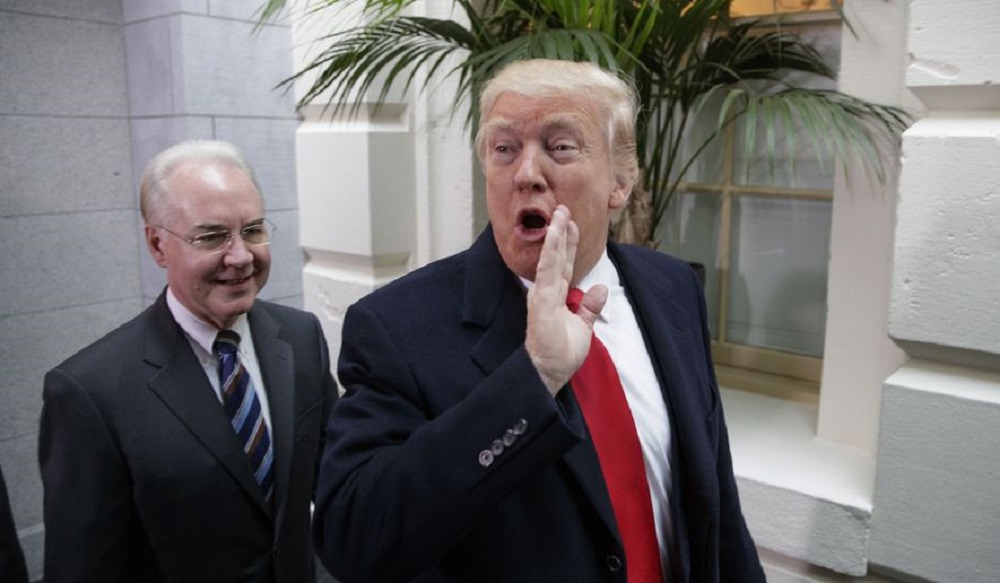
When Speaker of the House Paul Ryan began tackling the repeal and replacement of Obamacare, Donald Trump didn’t seem to care how it turned out. As time drew on, he didn’t mention it much, but after the most disastrous week of his presidency, he’s suddenly going into attack mode to get Congress to pass it.
President Donald Trump cajoled House Republicans at the White House Wednesday as party leaders revved up pressure on balky lawmakers and the hours ticked down to a crunch time vote on their health care overhaul bill.
Outnumbered Democrats condemned the measure as a transfer of money to the rich, and former Vice President Joe Biden predicted the legislation would fail.
A day before the House planned showdown roll calls, Trump and Vice President Mike Pence asked Republicans for support in what would be a significant achievement for his young presidency or a stinging defeat if they failed. Republicans said the votes would occur Thursday, even as leaders planned near-continuous meetings with dissident and wavering lawmakers.
Asked by reporters if he’d keep pushing a health overhaul if the House rejects the measure, Trump said, “We’ll see what happens.”
Rep. Patrick McHenry, R-N.C., a member of the House GOP leadership, said around 10 House members were meeting with Trump. White House visitors included members of the hard-right House Freedom Caucus, where the bulk of opposition lies.
“We’re bringing them to the closer,” McHenry said.
Some also met with Pence, including top House GOP vote counter Rep. Steve Scalise, R-La.
Underscoring the bill’s uncertain fate, a senior administration official said that 20 to 25 House Republicans remained opposed or undecided. That’s a grave figure since united Democratic opposition means the measure crashes if 22 GOP lawmakers vote “no.”
In a rally on the Capitol steps, Democratic leaders denounced the Republican drive to demolish former President Barack Obama‘s health care law, a GOP pledge since the statute’s 2010 enactment. They criticized its elimination of tax increases Obama imposed on high earners and health care companies while reducing federal help for many low-income people and cutting Medicaid, which helps the poor pay medical bills.
“It ain’t going anywhere,” said former Vice President Joe Biden. “This is not going to pass.”
Democrats champion Obama’s statute for its expansion of health care coverage to 20 million more people and requiring insurers to cover the very ill, families’ grown children to age 26 and specified services like mental health care.
Interviewed on CNN, House Rules Committee Chairman Pete Sessions, R-Texas, said Trump’s credibility problem over his wiretapping allegations and other issues “does hurt” GOP attempts to win votes. He also pointed to voters who remain dubious.
“The people back home are not sold on what we’re doing yet,” he said.
As the Rules Committee met to set the contours of Thursday’s planned floor debate, Republicans said their legislation would help achieve their long-time goal.
“We have the best opportunity in seven years to repeal this sinking ship of Obamacare,” said House Ways and Means Chairman Kevin Brady, R-Texas. He said the GOP bill would “deliver a health care system that truly works for the American people.”
Democrats focused on recent projections by the nonpartisan Congressional Budget Office that the GOP would cost 24 million people coverage in a decade and drive up out of pocket costs for many, particularly lower earners and older people.
“Sometimes I think my Republican friends have lost their human ability to feel what 24 million people really means,” said Rep. Jim McGovern, D-Mass.
The Republican legislation would halt Obama’s tax penalties against people who don’t buy coverage and shrink the federal-state Medicaid program for low earners, which the statute has expanded. It would provide tax credits for medical bills, though generally skimpier than the aid Obama’s statute provides. It also would allow insurers to charge older Americans more and repeal tax boosts the law imposes on high-income people and health industry companies.
The Rules committee, usually tightly controlled by GOP leadership, was expected to let the chamber vote on revisions that top Republicans concocted to win votes. These include adding federal aid for older people and protecting upstate New York counties – but not Democratic-run New York City – from repaying the state billions of dollars for Medicaid costs.
Many conservatives are demanding that the bill void Obama’s restrictions on insurers, which they say drive up premiums. Moderates’ concerns include a worry that the measure would snatch insurance from many voters – a week after the nonpartisan Congressional Budget Office said the measure would toss 24 million off coverage in a decade.
The budget office had projected the original bill would cut federal deficits by $337 billion over a decade. But those savings are plummeting as top Republicans dole out provisions to nail down backing. Language helping older and disabled people includes $85 billion set aside for the Senate to beef up tax credits for people aged 50 to 64, who budget analysts said would see big cost increases from the GOP bill.
Republicans face an even tougher fight in the Senate, which they control by just 52-48. Six GOP senators have already said they oppose the legislation, enough to sink it without changes.

